Tidal surge hits east UK coastal towns after storm
- Published
Homes and property were destroyed by the huge tidal surge, as Sian Lloyd reports
The tidal surge which hit the east coast of Britain has been described as the "most serious" for 60 years.
Thousands were forced to abandon their homes as tides in parts of the North Sea reached higher levels than the devastating floods of 1953.
Flood waters have receded in many areas but authorities are warning that high tides later on Friday could cause further damage.
Meanwhile, two people who died in the storm have been named by police.
Lorry driver Robert Dellow, 54, from Lowestoft, in Suffolk, died after his vehicle overturned in West Lothian and 83-year-old John Arthur White, was struck by a falling tree in Retford, Nottinghamshire.
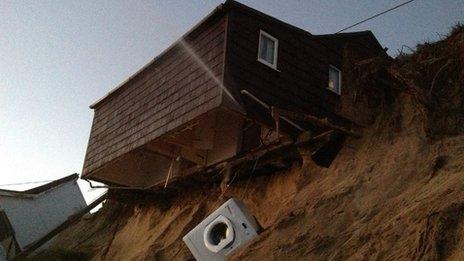
Seven cliff-top homes collapsed in Hemsby, Norfolk, due to the tidal surge
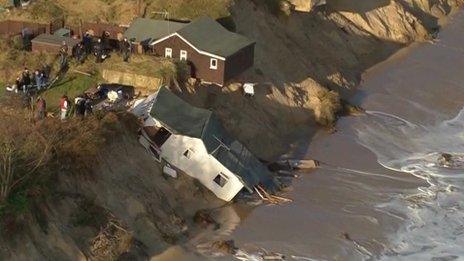
The Environment Agency called the tidal surge the "most serious" for 60 years
Seven cliff-top homes collapsed in Hemsby, Norfolk, where a lifeboat station has been also washed into the sea.
Steven Connelly, owner of one of the destroyed properties, heard there was a problem while he was at a local pub which was holding a fundraiser for coastal defences.
He told the BBC people "from all over the village" formed a human chain to help get his family's possessions - and his kittens - out before the building fell.
Mr Connelly, who lived at the property with his wife, said he did not think his insurance would pay out because the damage was caused by coastal erosion.
But the Environment Agency said 800,000 homes had been protected by flood defences and better forecasting had given people "vital time" to prepare.
The agency added: "Significant flooding along the east coast of England is expected to continue today [Friday], as the most serious coastal tidal surge for over 60 years will continue to affect communities."
Environment Secretary Owen Paterson chaired a meeting of the government's Cobra committee to discuss the floods.
Speaking afterwards, he said the situation was "not over" and asked the public to follow advice from police and other authorities.
"Conditions like this only occur in some places every 500 years," he said.
He added: "And I would really pay tribute to all of those who have been working through the night."
-
Homes flooded in Whitby
×About 100 homes in Whitby, North Yorkshire, were flooded as the worst storm surge on record hit coastal towns on the east of Britain. Dan Johnson met one man trying to clean up.
-
Cleaning up in Boston
×Residents in Boston, Lincolnshire are cleaning up after a tidal surge hit coastal towns on the east of Britain. Ben Brown reports.
-
Bungalow falls down cliff at Hemsby
×A bungalow fell 20 feet down a cliff after a tidal surge hit Hemsby in Norfolk. Steven Connelly explains how he rushed home to salvage what he could.
-
Thousands of homes evacuated
×Thousands of people spent the night away from their homes as a severe storm battered large parts of the UK. The BBC's Nick Beake reports from Clacton-on-Sea in Essex
Before dawn the Environment Agency, which covers England and Wales, had more than 50 severe flood warnings in place, external, but that number has fallen steadily during the day.
The agency said some flood defences had been breached but repairs were under way.
Rescue teams have been working through the night in many areas.
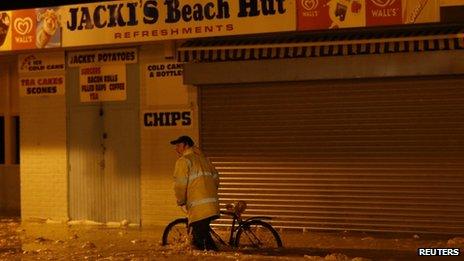
Many residents have been evacuated in Great Yarmouth, Norfolk
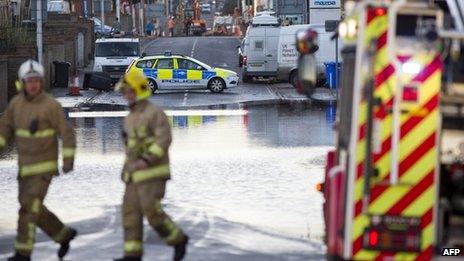
The storm surge caused flooding at east coast locations including Lowestoft in Suffolk
In other developments:
Norfolk Police told thousands of residents that there was no longer a need for them to stay away from their homes, and that rest centres would now be closed down
Soldiers have helped the flood prevention effort in Essex and Norfolk
A mother and baby were among those rescued from flooding in Essex
The Environment Agency said 400 homes in the Humber region were affected by flood water on Thursday night
In Kent, more than 500 properties were evacuated in areas including Sandwich, Seasalter, Faversham and the Medway towns
Homes were flooded in Boston, Lincolnshire, and 223 people spent the night in evacuation centres. Police have now said it is safe for residents to return home but advised they check with uniformed officers before re-entering their property
Sea defences in Scarborough, North Yorkshire, have been damaged by the tidal surge
Gale-force winds affected many parts of Scotland on Thursday, causing major transport disruption including all train services being stopped.
Transport in Scotland is now returning to normal, but thousands of homes are still without electricity.
The Scottish Environment Protection Agency has now lifted its flood warnings, external but the Met Office has yellow weather warnings, external in place for snow in northern Scotland until 12:00 GMT.
There are also yellow warnings for ice in parts of Northern Ireland and north-west England, and wind on England's east coast. Yellow warnings mean "be aware".
High tides in parts of north Wales battered by storms hours earlier passed without further major flooding.
Lifeboat crews from south Wales were drafted in to help colleagues in the north amid fears coastal areas could be hit for a second time in 24 hours.
But emergency services have reported a mostly quiet Friday morning so far.
Northern Ireland Electricity (NIE) said it had restored power to most customers after strong winds caused disruption to supplies.
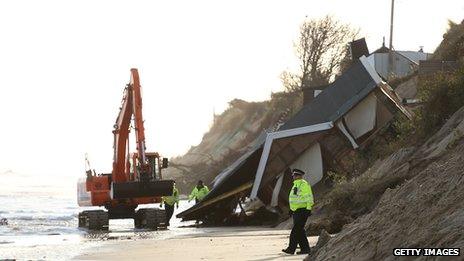
The clean up operation has begun in Hemsby, where seven homes fell into the sea
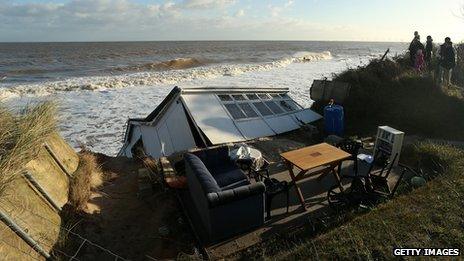
But the Environment Agency said 800,000 homes had been protected
BBC weather presenter Matt Taylor explained that "storm surges" begin when a rising area of low pressure takes pressure off the surface of the sea, allowing it to "bulge" upwards.
"Then, as that pulls away, you get the very strong winds on the back edge of the low pressure and then that shoves that bulge of high sea levels down through the North Sea," he said.
Conditions across the UK are expected to have improved by the weekend.
In northern Europe, hurricane-force winds and tidal surges killed at least five people, flooded parts of Hamburg and left thousands of homes without electricity.




